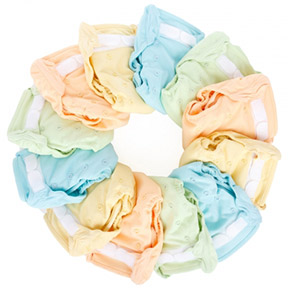Like everything else, baby diapers too, have their set of vices. Even though they save the day by not spoiling your baby’s cute outfit, baby diapers can be uncomfortable and can cause rashes on your baby’s soft skin. However, all of these problems can easily be avoided if few precautions are taken.
Diapering
With practice, you can do diapering quite systematically although you might find it time-consuming part of childcare in the beginning. Until the age of three, your baby might need diapers to collect the urine and bowel passing as it has no or little control on his/her bladder and bowel movements.
Types of Diapers
There are two kinds of diapers; one is a cloth diaper and other is a disposable diaper. Both kinds of diapers have their respective advantages and disadvantages, which leaves the option of choosing a particular kind of diaper to the parents. Parents can choose what works for the baby or can actually combine the best of both the diaper kinds.
Cloth Diapers
Cloth diapers can be washed and dried for reuse. They come in many shapes and sizes. Hence, they are durable and cost-effective. A terry cloth material which is gentle on the baby’s tender skin is used to make cloth diapers. These diapers since they are made of cloth allow your baby’s skin to breathe and the child’s bottom gets more air circulation which is not only comfortable for the baby but also prevents diaper rashes. The biggest disadvantage would be that the diapers need to change immediately in case if it gets wet or soiled.
Advantages:
- Natural fibre material which is proved to be gentle on baby’s tender skin is used to make cloth diapers.
- Cheaper than disposable diapers
- They are reusable and are durable too
- Allow baby’s bottom to breath and prevent diaper rashes
Disadvantages:
- They are not good absorbers and hence are more prone to leakage which needs to further protection in form of diaper covers, diaper doublers or pants
- Laundering and drying can make usage of cloth diapers a tedious affair and new mothers may be too tired and busy for taking time out for washing.
- Not a good option while travelling or for a long duration.
- Not as eco-friendly as thought to be, as water and detergent need to be used for frequent washing and sanitizing.
Disposable Diapers
As the name says they can be used once and needs to be disposed of after the use. Disposable diapers are made of a superabsorbent gelling material which, when saturated, needs to be thrown. Environmental factors and eco-friendliness are in a debate as they pose serious to risks to the people and landfills. Toxic chemicals such as toluene, ethylbenzene, xylene and dipentene have been linked to adverse health effects in humans with long-term exposure. The inner absorbent layer of a disposable diaper is also treated with chemicals, which can trigger allergic reactions. Disposable diapers often contain dyes and dioxin, which is formed as a by-product of the chlorine bleaching process. Dioxin is a carcinogen, which means it can cause cancer. When released into the environment, the toxin can accumulate in humans and animals.
Advantages:
- Disposable diapers are convenient to use and are not time-consuming as they do not need any laundering and drying. They are meant for a single use after which they need to be disposed of.
- Since they are made of the superabsorbent gelling material they take away all the moisture and give a feeling of comfort and complete dryness to the baby.
- Extremely convenient while travelling or for long durations.
Disadvantages:
- They are expensive when compared to cloth diapers.
- Since they are super absorbent, many parents change diapers only after a long period of time. Extreme saturation of the diapers can give rise to diaper rashes.
- There is continuing debate on the eco-friendliness factor of disposable diapers

